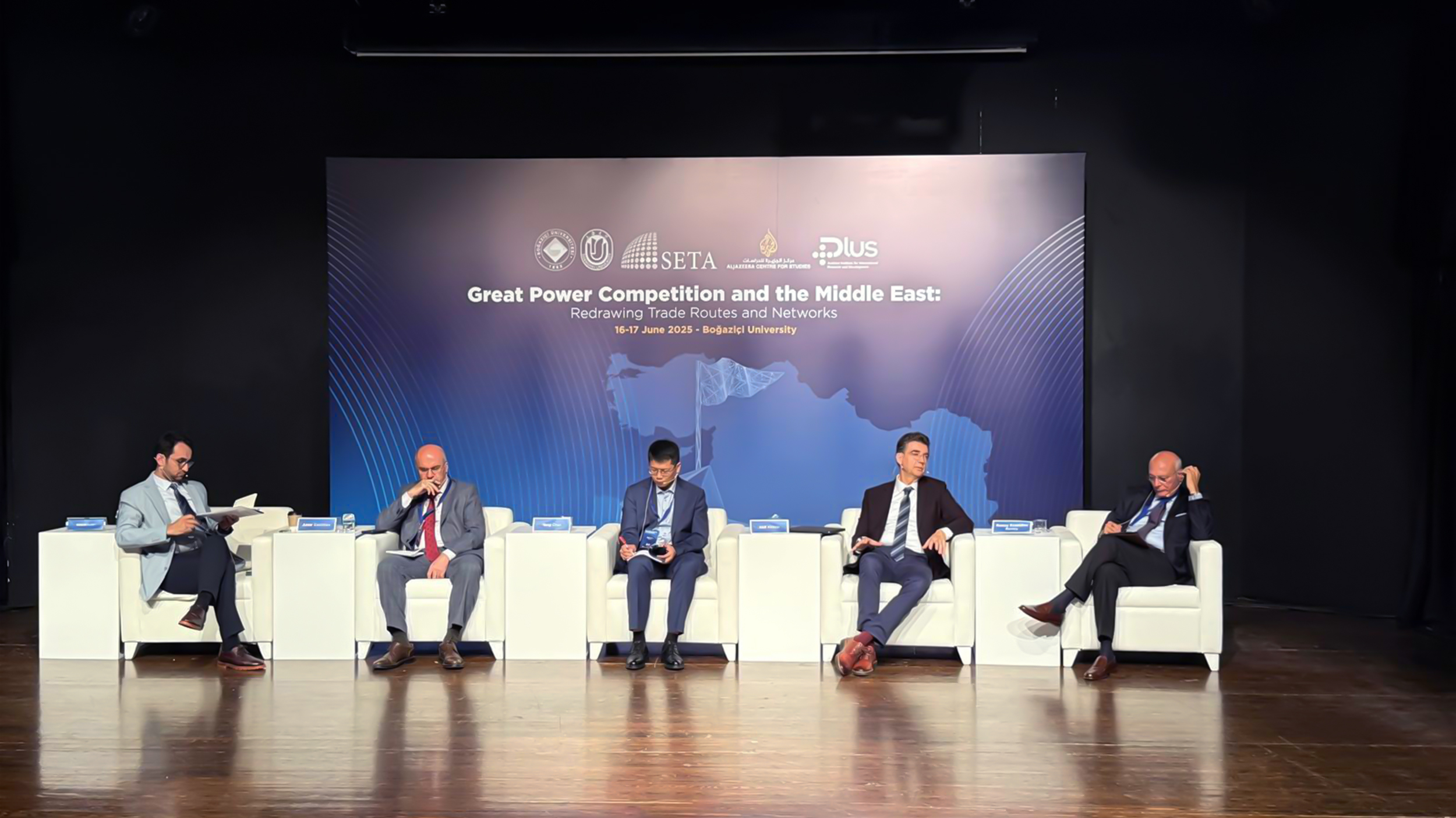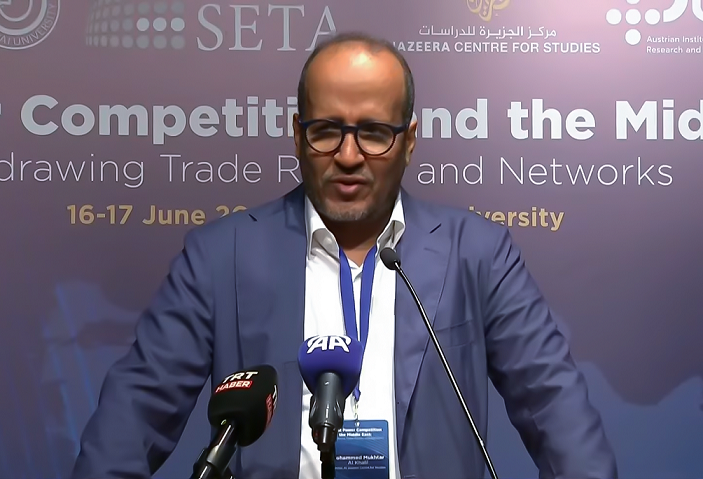
Amid rapid transformations in the international order and intensifying competition among major powers over influence and resources, Boğaziçi University in Turkey hosted a high-level international conference on 16 and 17 June 2025, titled “Great Power Competition and the Middle East: Redrawing Trade Routes and Networks”. The event was jointly organised with Al Jazeera Centre for Studies and brought together academic institutions from China, Turkey and Europe, as well as a select group of researchers and experts.
Over the course of two days, the conference examined the geopolitical and economic dimensions of global connectivity and infrastructure projects, chief among them China’s Belt and Road Initiative (BRI), the India-Middle East-Europe Economic Corridor (IMEC), the Development Road project between Iraq and Turkey and the European infrastructure initiative. Special attention was given to the strategic role of the Middle East in these projects, as a critical intersection point in reshaping global trade networks and international alliances.
The nature of international competition
In his opening remarks, Mohammed Mukhtar Al Khalil, Director of Al Jazeera Centre for Studies, offered a deep strategic reading of the current global rivalry, stressing that great powers today are not merely redrawing borders, but are striving to build renewed networks of interests and alternative trade routes that map out future zones of influence. He argued that a new global order cannot be born without dismantling the remnants of the old one, and that developments in Gaza and Iran are vivid expressions of this transformation.

Al Khalil identified three blocs vying in the region: rising powers, declining powers and independence-seeking powers. He noted that the conference aimed to foster a collective understanding of these shifts, helping researchers and decision-makers anticipate pathways out of the Middle East's recurring crises.
Alternative Strategies
Wu Xueming, Vice President of the Shanghai Academy of Social Sciences, emphasised the Middle East’s strategic importance within the BRI. He stated that China seeks to build relations based on mutual understanding and integration – particularly in renewable energy, communications and cultural exchange – rather than dominance or polarisation. He reaffirmed Beijing’s commitment to strengthening international cooperation and supporting regional stability, steering clear of strategies rooted in chaos or fragmentation.
The war on Iran: A turning point
From Turkey, Murat Yeşiltaş, Director of Foreign Policy Studies at SETA Foundation, argued that the war against Iran is not a transient development but a pivotal event signalling a reconfiguration of international relations and shifting power balances. He highlighted the failure of the international system and its institutions in dealing with Middle East crises, citing the lack of unified value-based references and structural contradictions in global organisations.
The fragility of the international system
Selçuk Aydın, Associate Dean of the Faculty of Economics at Boğaziçi University, asserted that current events – from the war in Gaza to the escalation in Ukraine and growing tensions among Western powers – reflect profound fragility in the international system's economic and social foundations. He argued that trade corridors and supply chains are no longer merely logistical pathways but tools of geopolitical rivalry and strategic polarisation. Aydın called for a comprehensive rethinking of global economic security concepts, as economic interests increasingly intertwine with military and political power balances.
Highlights from day one
The disintegration of the international system, conflicting interests and technological shifts
The first day’s sessions explored the fragmentation of the current international order, emphasising that ongoing events, particularly in Gaza, have exposed deep vulnerabilities in the global economic and social structure. Amid rising tensions, supply chains and global corridors are becoming arenas of geopolitical competition. Discussions noted the intensifying strategic rivalry between Western powers and in the Middle East, with the war in Ukraine and ongoing European tensions continuing to impact global trade and energy sectors.
Critical views were presented on the role of major powers in fuelling regional instability, portraying continued unrest in the Middle East as a tool for controlling energy resources and supply routes. In contrast, several participants called for a new world order based on harmony, partnership and civilisational coexistence.
The weakening of international legal structures was also discussed, especially in the absence of accountability for military violations in the Palestinian context—seen as a direct threat to the legal foundations of international relations and a shift toward a world governed more by power than law.
Sessions also examined Turkey’s evolving regional role, rejecting narratives linking Ankara’s involvement in certain issues to “neo-Ottoman nostalgia”, and instead emphasising its confidence-based and mediatory approach aimed at de-escalation.
In the technological sphere, panellists argued that global competition now centres on digital dominance and technological superiority, rather than military expansion alone. Concerns were raised about US efforts to curb the rise of competitors like China and Turkey through control of digital space and security alliances.
These discussions formed an analytical framework for understanding how regional and global powers envision the future of the international system, in light of a world showing more signs of fragmentation than stability.
Highlights from day two
The Middle East: A laboratory for multipolarity
The second day expanded the discussion to examine the Middle East’s place within an increasingly fragmented and restructured global order. The world is no longer defined by Cold War bipolarity or unipolar dominance but is now an arena for interactions between rising and declining powers and shifting alliances based on changing interests and circumstances.
Sessions explored whether regional states could launch their own integrative initiatives, independent of externally driven projects. They posed fundamental questions about the Middle East’s capacity, given its complex political reality, to develop an independent regional integration agenda.
Discussions focused on the role of regional organisations like the Arab League, the Organisation of Islamic Cooperation, the Gulf Cooperation Council and the Organisation of Turkic States as potential platforms for such a vision. Yet most participants agreed that political disunity, internal conflicts and the absence of a shared vision remain major obstacles to building intra-regional trade and economic pathways that respond to local priorities.
Political and logistical challenges were also addressed, including cross-border infrastructure gaps, mutual distrust among neighbouring states and the entanglement of security concerns with economic projects, making independent regional integration a difficult, though not impossible, objective.
The conference gave special attention to Turkey’s exclusion from the IMEC project, interpreting it as a sign of emerging geopolitical alignments that are redrawing the region’s map of influence and interests. This exclusion was linked to Ankara’s growing push for alternative initiatives, particularly the Development Road Project with Iraq. This project aims to connect Iraq’s Basra ports in the south to Turkey’s Mersin port on the Mediterranean via a land corridor and rail network cutting through Iraqi–Turkish territory.
Speakers viewed this project as more than a logistical alternative; it carries significant strategic implications. It could help free regional economic decision-making from external dominance, position Iraq as a vital transit hub between Asia and Europe and restore Turkey’s role as a strategic crossroads between East and West. However, the project still faces major hurdles, including security stability, infrastructure financing and the degree of international engagement in its execution.
Overall, the second day’s sessions presented a realistic and critical approach to the Middle East’s role in a multipolar world, posing a central question: Can the region transition from a marginal player in global power contests to an independent actor capable of shaping its own networks and choices? While the answer remains open, the conference succeeded in outlining the challenge, and perhaps sketching the contours of a path forward.
Conclusion
The conference concluded with the announcement of several research outputs designed to translate theoretical debates into actionable knowledge and policy tools. These included the preparation of an edited volume documenting the most significant papers and discussions, produced in collaboration with Al Jazeera Centre for Studies and an international publisher, along with the release of policy briefs derived from the analyses presented during the sessions.
It was also agreed to organise follow-up research events, such as specialised conferences, workshops and consultation meetings, to deepen discussion on the issues raised and broaden their reach among research and policymaking circles.
Despite diverse contributions and differing perspectives, the conference reflected a shared conviction: the Middle East is no longer a mere geographical margin in the global power map, but one of its decisive arenas where competing projects of influence intersect, and where the features of the emerging world order are being tested.